|
|
|
Sort Order |
|
|
|
Items / Page
|
|
|
|
|
|
|
| Srl | Item |
| 1 |
ID:
118681
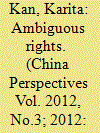

|
|
|
| 2 |
ID:
118673


|
|
|
| 3 |
ID:
118674
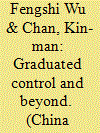

|
|
|
|
|
| Publication |
2012.
|
| Summary/Abstract |
Despite recent policy changes, governmental monitoring and control of grassroots NGOs remain pervasive and effective to a large extent in China. The enforcement of control over NGOs is complicated by at least three layers of factors: First, multiple agencies are involved in NGO control without a centralised norm. Second, government-NGO interactions vary across cases and are deeply rooted in local political contexts. Last, but not least, since the NGO community at its origin is highly diverse, NGOs' responses to various types of governmental control differ, which in turn triggers further complications. The main findings of this research are based on interviews with 60 NGO staff, as well as with civil affairs officials in Shanghai and Shenzhen from January 2011 to May 2012.
|
|
|
|
|
|
|
|
|
|
|
|
|
|
|
|
| 4 |
ID:
118680
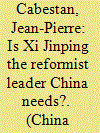

|
|
|
|
|
| Publication |
2012.
|
| Summary/Abstract |
In autumn 2012, following the 18th Congress of the Chinese Communist Party (CCP), Xi Jinping is to succeed Hu Jintao as General Secretary of the Party and also, in all probability, as Chairman of the Central Military Commission, where he has been second-in-command since 2010. In March 2013, he is set to become President of the People's Republic of China. Born into the political elite, he enjoys a great deal of support in the Nomenklatura. Having governed several coastal provinces, the current Vice-President is thoroughly acquainted with the workings of Party and state. He also has support within the Army, where he spent a short time at the beginning of his career. In addition, in recent years, he has acquired significant international experience. Urbane and affable, Xi is appreciated for his consensual approach. Nonetheless, Xi is taking charge of the country at a particularly delicate time. China is having to adopt an alternative growth model whilst the government is struggling with powerful economic and regional feudalities. The Bo Xilai affair has highlighted the weakening of the central government, the corruption of the elites, and deep-rooted ideological differences within the Party machine that are damaging the political legitimacy of the regime and endangering its stability. As a result, Xi must not onlyreunify the Party leadership and machine but also establish his authority over all the country's civil and military institutions. His style and charisma will help him. But his success will also and above all depend on his ability to form a united coalition set on reform and capable of dismantling the privileges acquired by the regime's many bosses. The CCP needs a leader who is both strong and courageous. Is Xi such a man? Perhaps.
|
|
|
|
|
|
|
|
|
|
|
|
|
|
|
|
| 5 |
ID:
118683
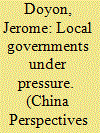

|
|
|
| 6 |
ID:
118675
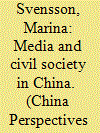

|
|
|
|
|
| Publication |
2012.
|
| Summary/Abstract |
Although Chinese journalists are not able to create their own independent organisations, they are engaging in informal networking on-line and off-line that has created a strong sense of community among investigative journalists in particular. Through sharing experiences, stories, and struggles, journalists create a collective identity and define their roles in society. Earlier studies of Chinese journalists haven't explicitly addressed the issue of how a journalistic community is created and sustained in a society that lacks freedom of the press and where freedom of association is severely restricted, and the importance of new information and communication technologies (ICTs) in this context, which is the focus of this article. Furthermore, it is important to study the extent to which and how investigative journalists network with other groups in society, including lawyers, public intellectuals, and civil society organisations. With the development of micro-blogging (weibo) we see new forms of community building, more open expressions of solidarity and ironic resistance, as well as increasing levels of interactivity between different groups in society. By reporting on injustices and the situation of marginalized groups in society, and commenting on public events on weibo, investigative journalists interact with many different groups in society and become part of a larger community of people who share the same ideals and struggles. Some journalists go one step further and set up or become actively involved in charity work and civil society organisations.
|
|
|
|
|
|
|
|
|
|
|
|
|
|
|
|
| 7 |
ID:
118677
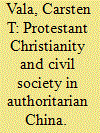

|
|
|
|
|
| Publication |
2012.
|
| Summary/Abstract |
Religious groups can reinforce, complement, or undermine authoritarian domination. This article investigates whether high-status Protestant churches act as democratising civil society organisations by gathering hundreds of Protestants openly outside state structures to change church registration policies. In so doing, they also seek to curtail state domination over religion and, by extension, over all groups in society.
|
|
|
|
|
|
|
|
|
|
|
|
|
|
|
|
| 8 |
ID:
118682


|
|
|
| 9 |
ID:
118676


|
|
|
|
|
| Publication |
2012.
|
| Summary/Abstract |
The rise of China's rights defence movement has occurred in tandem with the rapid development of the Internet in China. Various forms of rights defence inside and outside of the courtroom have emerged and developed alongside changes to China's ideological, political, and legal systems and social structure. Similarly, Internet technology such as microblogs and other social media are enriching the modalities of activity in the rights defence movement, enhancing the mobilisation capacity of activists, and accelerating the systematisation of popular rights defence, profoundly affecting China's ongoing political transformation.
|
|
|
|
|
|
|
|
|
|
|
|
|
|
|
|
| 10 |
ID:
118679
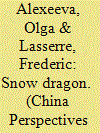

|
|
|
|
|
| Publication |
2012.
|
| Summary/Abstract |
In recent years, several analyses and news media articles have predicted a resurgence of tensions in the Arctic over access to maritime space. Among the contenders involved in this potential struggle is China, whose ambitions in the region are suspected to hold a destabilising potential. Yet, as Beijing is developing its policy towards the region, it remains unclear whether it will contest the claims over maritime access of countries bordering the Arctic and forcibly take over parts of the region for resource extraction purposes.
|
|
|
|
|
|
|
|
|
|
|
|
|
|
|
|
| 11 |
ID:
118678
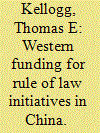

|
|
|
|
|
| Publication |
2012.
|
| Summary/Abstract |
Recent research has suggested that Western donors working in China have channelled most of their funds to government-affiliated entities, including state-affiliated think tanks, academic institutions, and government agencies, rather than to grassroots civil society organisations. A more state-centred approach may have made sense in the early years of the reform era, when few non-governmental organisations existed in China that could serve as effective partners to Western donors. Yet the rapid growth and development of the civil society sector in China over the last several years means that a number of new actors are doing very important work on a range of issues related to human rights and the rule of law. The author argues that Western funding for newly-formed grassroots civil society organisations is crucial to the ongoing development of Chinese civil society. In addition, because grassroots groups can often make fuller use of key advocacy tools, such as interest group mobilisation, media advocacy, and strategic litigation, they may in some cases be even more effective in pursuing progressive goals than academic or government-affiliated entities. Western donors active in China should take note of the rapidly-changing civil society landscape in China and make efforts to ensure that their funding strategies are in line with the evolving country context.
|
|
|
|
|
|
|
|
|
|
|
|
|
|
|
|
|
|
|
|
|